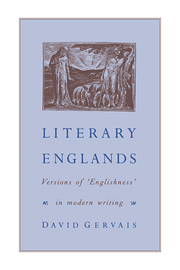Book contents
- Frontmatter
- Contents
- Preface
- Acknowledgements
- Abbreviations
- 1 The nineteenth century: pastoral versions of England
- 2 Edward Thomas: An England of ‘holes and corners’
- 3 Forster and Lawrence: exiles in the homeland
- 4 Late witness: George Sturt and village England
- 5 Contending Englands: F. R. Leavis and T. S. Eliot
- 6 Englands within England: Waugh and Orwell
- 7 Larkin, Betjeman and the aftermath of ‘England’
- 8 Geoffrey Hill and the ‘floating of nostalgia’
- Afterword: A homemade past
- Index
4 - Late witness: George Sturt and village England
Published online by Cambridge University Press: 15 October 2009
- Frontmatter
- Contents
- Preface
- Acknowledgements
- Abbreviations
- 1 The nineteenth century: pastoral versions of England
- 2 Edward Thomas: An England of ‘holes and corners’
- 3 Forster and Lawrence: exiles in the homeland
- 4 Late witness: George Sturt and village England
- 5 Contending Englands: F. R. Leavis and T. S. Eliot
- 6 Englands within England: Waugh and Orwell
- 7 Larkin, Betjeman and the aftermath of ‘England’
- 8 Geoffrey Hill and the ‘floating of nostalgia’
- Afterword: A homemade past
- Index
Summary
Few things uplift me so much as do suggestions that sometimes come, of England spreading out before and all around me.
This sense, which came to Sturt, seems to have reached Leavis mainly through literature, through the talk of Mrs Poyser in Adam Bede for instance:
George Eliot had grown up in a community in which that traditional art of speech flourished – the popular, generally cultivated art of speech that made the English language that made Shakespeare possible.
Yet though Leavis regards this language as the indispensable source of ‘English Literature’ he no longer regards it as an active constituent of English life. To understand the changes this implies one needs to turn to his response to Sturt, at the beginning of his critical career. There, in Culture and Environment, Sturt figures as a guarantee that what has since been lost once really existed. His name comes up with Bunyan's Pilgrim's Progress, ‘the supreme expression of the old English people’:
this great book, which is so much more than Bunyan's, will, together with (say) Change in the Village, The Wheelwright's Shop and the other works of George ‘Bourne’ (or Sturt) … serve to bring home to the doubting that the English people did once have a culture.
- Type
- Chapter
- Information
- Literary EnglandsVersions of 'Englishness' in Modern Writing, pp. 102 - 132Publisher: Cambridge University PressPrint publication year: 1993



